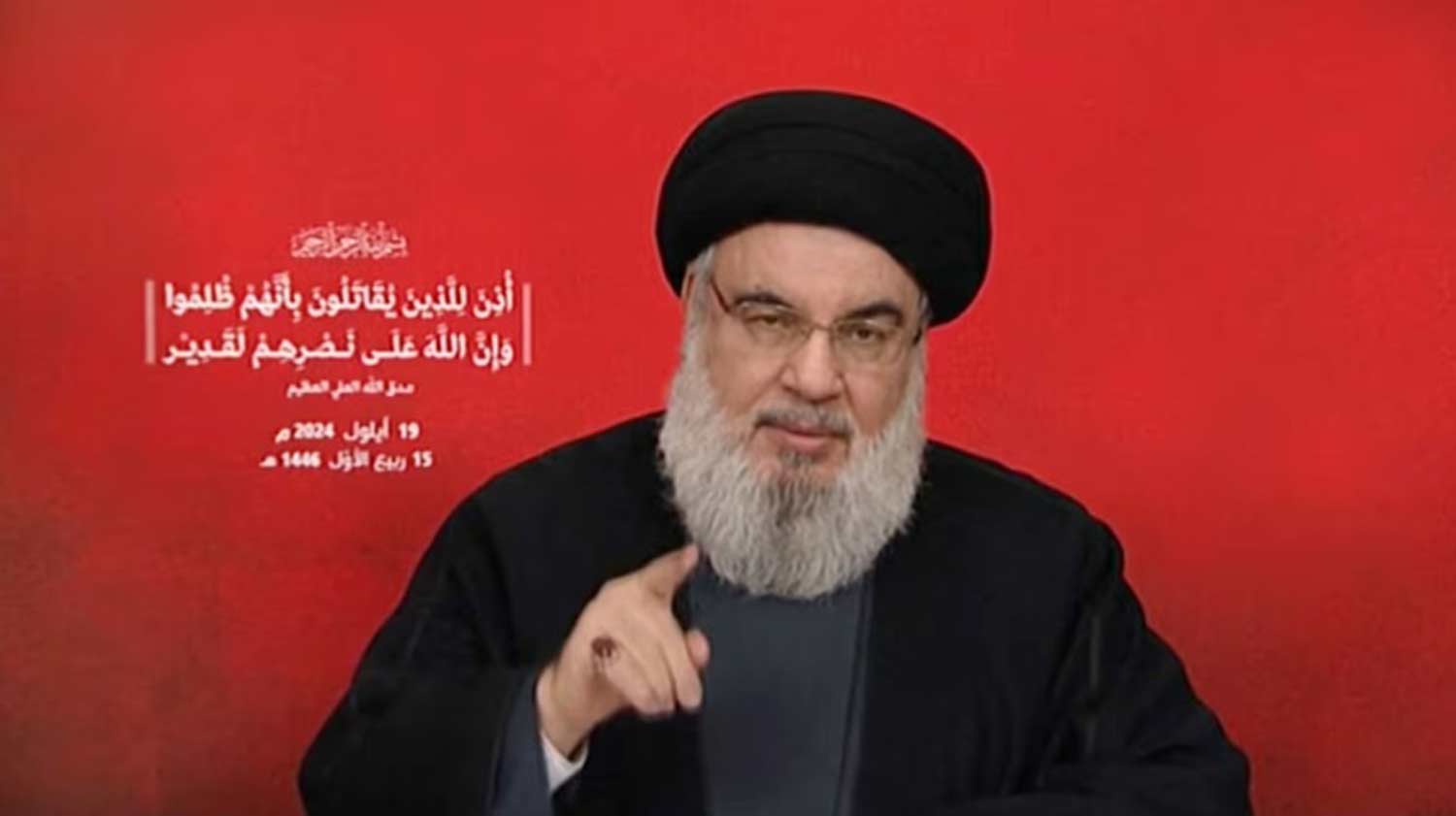The leader of Hezbollah, the Iran-backed Lebanese militant group, stated on Thursday that the lethal Israeli strikes that targeted Hezbollah’s communication systems crossed all boundaries. This declaration was made during a televised address as the sound of Israeli warplanes reverberated through Beirut.
Lebanon and Hezbollah have attributed the assaults on Hezbollah’s communication infrastructure to Israel, resulting in 37 fatalities and approximately 3,000 injuries, which have overwhelmed local hospitals and caused significant turmoil for the group.
While Israel has not officially acknowledged the attacks, security sources suggest they were likely executed by the Mossad, known for its history of conducting intricate operations abroad.
In his address, filmed in a secret location, Hezbollah leader Hassan Nasrallah remarked, “We have undoubtedly faced an unprecedented security and military setback in the history of the resistance and Lebanon.” He further stated, “This form of violence and targeting may be unparalleled globally,” appearing against a plain red backdrop while wearing his traditional black turban.
Nasrallah emphasized that the attacks “crossed all red lines,” asserting that “the enemy has exceeded all limits, laws, and ethical standards,” and suggested that these actions could be classified as war crimes or a formal declaration of war.
As his speech aired, the booming sounds of Israeli aircraft echoed through Beirut, a phenomenon that has become increasingly frequent in recent months, now carrying heightened implications amid escalating tensions. Israel confirmed that its aircraft conducted strikes in southern Lebanon overnight, while Hezbollah reported renewed airstrikes in the border region later in the day.
Israeli Defence Minister Yoav Gallant stated late Thursday that Israel will continue its military operations against Hezbollah. “In this new phase of the conflict, there are both significant opportunities and considerable risks. Hezbollah perceives itself as being targeted, and the series of military actions will persist,” Gallant remarked in a statement. “Our objective is to facilitate the safe return of Israel’s northern communities to their homes. As time progresses, Hezbollah will incur an escalating cost,” he added.
Nasrallah expressed that Hezbollah anticipated Israeli forces entering southern Lebanon, viewing it as a “historic opportunity” for the Iran-backed organization. He asserted that no military escalation, killings, assassinations, or full-scale war would lead to the return of Israeli residents to the border region. While Nasrallah characterized the assaults as unprecedented and accused Israel of attempting to kill 5,000 individuals, he downplayed the impact on Hezbollah, asserting that the group’s structure remained intact. “Indeed, we have suffered a significant and severe blow, but this is the essence of warfare,” Nasrallah stated. “We acknowledge that our adversary possesses technological superiority, and we have never disputed that.”
Iran’s Revolutionary Guards Commander Hossein Salami warned Nasrallah on Thursday that Israel would face “a crushing response from the axis of resistance,” according to state media.
In Paris, U.S. Secretary of State Antony Blinken called for restraint, expressing his desire to avoid any actions that could complicate a ceasefire agreement in Gaza. The Israeli military reported that two soldiers were killed in combat on Thursday in northern Israel, with N12 News indicating that one was killed by a drone and the other by an anti-tank missile launched by Hezbollah from Lebanon.
The strikes on Hezbollah’s communication infrastructure instilled fear throughout Lebanon, prompting individuals to discard electronic devices out of concern for hidden explosives.
Nasrallah stated that thousands of pagers were targeted at the same time, with some explosions occurring in hospitals, pharmacies, markets, and busy streets filled with civilians, including women and children. “This operation represents a breach of all laws and red lines by the enemy,” he remarked.
Following the cross-border attack by Hamas on October 7, which ignited the Gaza war, Hezbollah launched missiles at Israel, leading to ongoing exchanges of fire. While neither side has escalated the situation into a full-scale war, it has resulted in the evacuation of tens of thousands of individuals from the border regions on both sides. Israel’s military accused the Hezbollah terrorist organization of transforming southern Lebanon into a combat zone, asserting that for years, Hezbollah has utilized civilian homes for military purposes, constructed tunnels beneath them, and employed civilians as human shields.
On Wednesday, hand-held radios used by Hezbollah detonated throughout Lebanon, resulting in 25 fatalities and hundreds of injuries. The day prior, numerous pagers—employed by Hezbollah to avoid mobile phone tracking—exploded simultaneously, claiming 12 lives, including at least two children, and injuring over 2,300. Lebanese Prime Minister Najib Mikati urged the United Nations Security Council to take decisive action against what he termed Israel’s “aggression” and “technological warfare.”
Israel contends that its conflict with Hezbollah, similar to its war in Gaza against Hamas, is part of a broader regional struggle involving Iran, which supports both groups as well as various armed factions in Syria, Yemen, and Iraq. Additionally, on Thursday, Israeli security forces reported the arrest of an Israeli businessman last month after he participated in at least two meetings in Iran where discussions about assassinating Prime Minister Benjamin Netanyahu, the defense minister, or the head of the Shin Bet intelligence agency took place.
Israel faces allegations of conducting assassinations, notably a bombing in Tehran that resulted in the death of the Hamas leader, as well as an attack in a Beirut suburb that claimed the life of a high-ranking Hezbollah commander, both occurring within hours of one another in July.
Discover more from Defence Talks | Defense News Hub, Military Updates, Security Insights
Subscribe to get the latest posts sent to your email.





